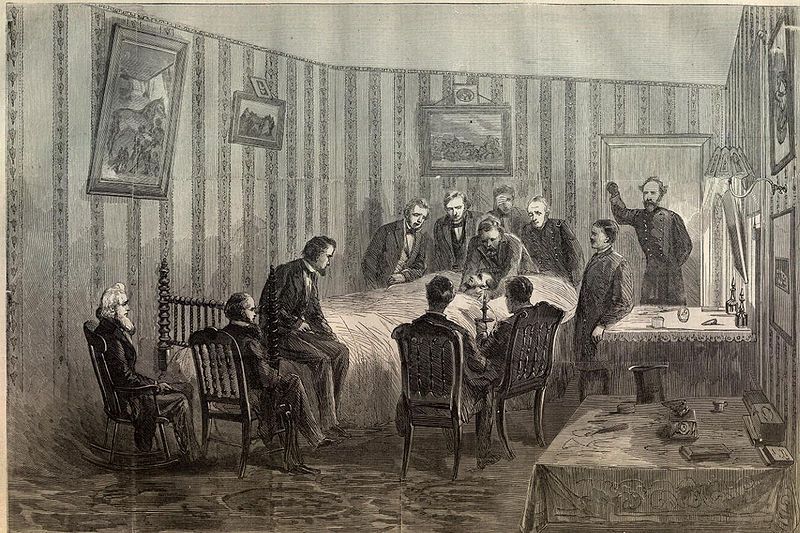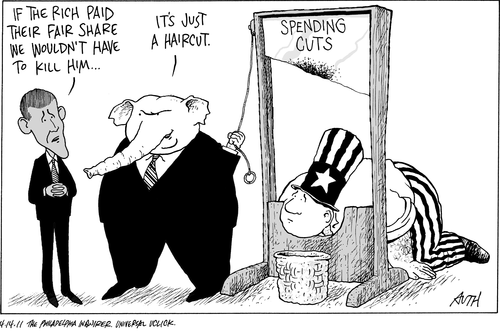This is your morning Open Thread. Pour your favorite beverage and review the past and comment on the future.
Find the past “On This Day in History” here.
April 14 is the 104th day of the year (105th in leap years) in the Gregorian calendar. There are 261 days remaining until the end of the year.
 On this day in 1865, President Abraham Lincoln is shot in the head at Ford’s Theatre in Washington, D.C. The assassin, actor John Wilkes Booth, shouted, “Sic semper tyrannis! (Ever thus to tyrants!) The South is avenged,” as he jumped onto the stage and fled on horseback. Lincoln died the next morning.
On this day in 1865, President Abraham Lincoln is shot in the head at Ford’s Theatre in Washington, D.C. The assassin, actor John Wilkes Booth, shouted, “Sic semper tyrannis! (Ever thus to tyrants!) The South is avenged,” as he jumped onto the stage and fled on horseback. Lincoln died the next morning.
The assassination of President of the United States Abraham Lincoln took place as the American Civil War was drawing to a close, just five days after the surrender of the commanding general of the Army of Northern Virginia, Robert E. Lee, and his battered [Army of Northern Virginia to General Ulysses S. Grant. Lincoln was the first American president to be assassinated, though an unsuccessful attempt had been made on Andrew Jackson in 1835.
The assassination was planned and carried out by well-known actor John Wilkes Booth as part of a larger conspiracy intended to rally the remaining Confederate troops to continue fighting. Booth plotted with Lewis Powell and George Atzerodt to kill Secretary of State William H. Seward and Vice President Andrew Johnson as well.
Lincoln was shot while watching the play Our American Cousin at Ford’s Theatre in Washington, D.C. with his wife, Mary Todd Lincoln . He died the next morning. The rest of the plot failed. Powell only managed to wound Seward, while Atzerodt, Johnson’s would-be assassin, lost his nerve and fled.
Death of President Lincoln
Dr. Charles Leale, a young Army surgeon on liberty for the night and attending the play, made his way through the crowd to the door at the rear of the Presidential box. It would not open. Finally Rathbone saw a notch carved in the door and a wooden brace jammed there to hold the door shut. Booth had carved the notch there earlier in the day and noiselessly put the brace up against the door after entering the box. Rathbone shouted to Leale, who stepped back from the door, allowing Rathbone to remove the brace and open the door.
Leale entered the box to find Rathbone bleeding profusely from a deep gash that ran the length of his upper left arm. Nonetheless, he passed Rathbone by and stepped forward to find Lincoln slumped forward in his chair, held up by Mary, who was sobbing. Lincoln had no pulse and Leale believed him to be dead. Leale lowered the President to the floor. A second doctor in the audience, Dr. Charles Sabin Taft, was lifted bodily from the stage over the railing and into the box. Taft and Leale cut away Lincoln’s blood-stained collar and opened his shirt, and Leale, feeling around by hand, discovered the bullet hole in the back of the head by the left ear. Leale removed a clot of blood in the wound and Lincoln’s breathing improved. Still, Leale knew it made no difference: “His wound is mortal. It is impossible for him to recover”.
Leale, Taft, and another doctor from the audience, Dr. Albert King, quickly consulted and decided that while the President must be moved, a bumpy carriage ride across town to the White House was out of the question. After briefly considering Peter Taltavull‘s Star Saloon next door, they chose to carry Lincoln across the street and find a house. The three doctors and some soldiers who had been in the audience carried the President out the front entrance of Ford’s. Across the street, a man was holding a lantern and calling “Bring him in here! Bring him in here!” The man was Henry Safford, a boarder at William Petersen’s boarding house opposite Ford’s. The men carried Lincoln into the boarding house and into the first-floor bedroom, where they laid him diagonally on the bed because he was too tall to lie straight.
A vigil began at the Petersen House. The three physicians were joined by Surgeon General of the United States Army Dr. Joseph K. Barnes, Dr. Charles Henry Crane, Dr. Anderson Ruffin Abbott, and Dr. Robert K. Stone. Crane was a major and Barnes’ assistant. Stone was Lincoln’s personal physician. Robert Lincoln, home at the White House that evening, arrived at the Petersen House after being told of the shooting at about midnight. Tad Lincoln, who had attended Grover’s Theater to see Aladdin and the Wonderful Lamp, was not allowed to go to the Peterson House.
Secretary of the Navy Gideon Welles and United States Secretary of War Edwin M. Stanton came and took charge of the scene. Mary Lincoln was so unhinged by the experience of the assassination that Stanton ordered her out of the room by shouting, “Take that woman out of here and do not let her in here again!” While Mary Lincoln sobbed in the front parlor, Stanton set up shop in the rear parlor, effectively running the United States government for several hours, sending and receiving telegrams, taking reports from witnesses, and issuing orders for the pursuit of Booth.
Nothing more could be done for President Lincoln. At 7:22 a.m. on April 15, 1865, he died. He was 56 years old. Mary Lincoln was not present at the time of his death. The crowd around the bed knelt for a prayer, and when they were finished, Stanton said, “Now he belongs to the ages”. There is some disagreement among historians as to Stanton’s words after Lincoln died. All agree that he began “Now he belongs to the…” with some stating he said “ages” while others believe he said “angels”
43 BC – Battle of Forum Gallorum: Mark Antony, besieging Julius Caesar’s assassin Decimus Junius Brutus Albinus in Mutina, defeats the forces of the consul Pansa, who is wounded.
69 – Vitellius, commander of the Rhine armies, defeats Emperor Otho in the Battle of Bedriacum and seizes the throne.
70 – Siege of Jerusalem: Titus, son of emperor Vespasian, surrounds the Jewish capital, with four Roman legions.
966 – After his marriage to the Christian Dobrawa of Bohemia, the pagan ruler of the Polans, Mieszko I, converts to Christianity, an event considered to be the founding of the Polish state.
1028 – Henry III, son of Conrad, is elected king of the Germans.
1205 – Battle of Adrianople between Bulgarians and Crusaders.
1294 – Temur, grandson of Kublai, is elected Khagan of the Mongols and Emperor of the Yuan Dynasty with the reigning titles Oljeitu and Chengzong.
1341 – Sack of Saluzzo (Italy) by Italian-Angevine troops under Manfred V of Saluzzo.
1434 – The foundation stone of Cathedral St. Peter and St. Paul in Nantes, France is laid.
1471 – In England, the Yorkists under Edward IV defeat the Lancastrians under the Earl of Warwick at the Battle of Barnet; the Earl is killed and Edward IV resumes the throne.
1699 – Khalsa: Birth of Khalsa, the
brotherhood of the Sikh religion, in Northern India in accordance with the Nanakshahi calendar.
1775 – The first abolition society in North America is established. The Society for the Relief of Free Negroes Unlawfully Held in Bondage is organized in Philadelphia, Pennsylvania by Benjamin Franklin and Benjamin Rush.
1816 – Bussa, a slave in Barbados, leads a slave rebellion and is killed. For this, he is remembered as the first national hero of Barbados.
1828 – Noah Webster copyrights the first edition of his dictionary.
1846 – The Donner Party of pioneers departs Springfield, Illinois, for California, on what will become a year-long journey of hardship, cannibalism, and survival.
1860 – The first Pony Express rider reaches Sacramento, California.
1865 – U.S. President Abraham Lincoln is assassinated in Ford’s Theatre by John Wilkes Booth.
1865 – U.S. Secretary of State William H. Seward and his family are attacked in his home by Lewis Powell.
1881 – The Four Dead in Five Seconds Gunfight is fought in El Paso, Texas.
1890 – The Pan-American Union is founded by the First International Conference of American States in Washington, D.C.
1894 – The first ever commercial motion picture house opened in New York City using ten Kinetoscopes, a device for peep-show viewing of films.
1909 – A massacre was orgaized by Ottoman Empire against Armenian population of Cilicia.
1912 – The British passenger liner RMS Titanic hits an iceberg in the North Atlantic at 11:40pm. The ship sinks the following morning with the loss of 1,517 lives.
1927 – The first Volvo car premieres in Gothenburg, Sweden.
1931 – Spanish Cortes depose King Alfonso XIII and proclaims the 2nd Spanish Republic.
1935 – “Black Sunday Storm”, the worst dust storm of the U.S. Dust Bowl.
1939 – The Grapes of Wrath, by American author John Steinbeck is first published by the Viking Press.
1940 – World War II: Royal Marines land in Namsos, Norway in preparation for a larger force to arrive two days later.
1941 – World War II: The Ustashe, a Croatian far-right organization is put in charge of the Independent State of Croatia by the Axis Powers after the Axis Operation 25 invasion.
Rommel attacks Tobruk.
1944 – Bombay Explosion: A massive explosion in Bombay harbor kills 300 and causes economic damage valued then at 20 million pounds.
1945 – Osijek, Croatia, is liberated from fascist occupation.
1956 – In Chicago, Illinois, videotape is first demonstrated.
1958 – The Soviet satellite Sputnik 2 falls from orbit after a mission duration of 162 days.
1969 – At the U.S. Academy Awards there is a tie for the Academy Award for Best Actress between Katharine Hepburn and Barbra Streisand.
1978 – 1978 Tbilisi Demonstrations: Thousands of Georgians demonstrate against Soviet attempts to change the constitutional status of the Georgian language.
1981 – STS-1 – The first operational space shuttle, Columbia (OV-102) completes its first test flight.
1986 – In retaliation for the April 5 bombing in West Berlin that killed two U.S. servicemen, U.S. president Ronald Reagan orders major bombing raids against Libya, killing 60 people.
1986 – 1 kilogram (2.2 lb) hailstones fall on the Gopalganj district of Bangladesh, killing 92. These are the heaviest hailstones ever recorded.
1988 – The USS Samuel B. Roberts strikes a mine in the Persian Gulf during Operation Earnest Will.
1988 – In a United Nations ceremony in Geneva, Switzerland, the Soviet Union signs an agreement pledging to withdraw its troops from Afghanistan.
1994 – In a U.S. friendly fire incident during Operation Provide Comfort in northern Iraq, two United States Air Force aircraft mistakenly shoot-down two United States Army helicopters, killing 26 people.
1999 – NATO mistakenly bombs a convoy of ethnic Albanian refugees – Yugoslav officials say 75 people are killed.
1999 – A severe hailstorm strikes Sydney, Australia causing A$2.3 billion in insured damages, the most costly natural disaster in Australian history.
2002 – Venezuelan President Hugo Chavez returns to office two days after being ousted and arrested by the country’s military.
2003 – The Human Genome Project is completed with 99% of the human genome sequenced to an accuracy of 99.99%.
2003 – U.S. troops in Baghdad capture Abu Abbas, leader of the Palestinian group that killed an American on the hijacked cruise liner the MS Achille Lauro in 1985.
2005 – The Oregon Supreme Court nullifies marriage licenses issued to gay couples a year earlier by Multnomah County.
2007 – At least 200,000 demonstrators in Ankara, Turkey protest against the possible candidacy of incumbent Prime Minister Recep Tayyip Erdogan.
2010 – Nearly 2,700 are killed in a magnitude 6.9 earthquake in Yushu, Qinghai, China.
Holidays and observances
* Ambedkar Jayanti (India)
* Black Day (South Korea)
* Christian Feast Day:
Bènézet
Domnina of Terni
Lidwina
Peter Gonzalez
April 14 (Eastern Orthodox liturgics)
* Day of the Georgian language (Georgia)
* Day of Mologa (Yaroslavl Oblast, Russia)
* N’Ko Alphabet Day (Mande speakers)
* New Year festivals in South and Southeast Asian cultures, celebrated on the sidereal vernal equinox:
Assamese New Year, or Rongali Bihu (India’s Assam Valley)
Bengali New Year, or Pohela Boishakh (Bangladesh and India’s West Bengal state)
Burmese New Year, or Thingyan (Burma)
Hindu and Sikh New Year, or Vaisakhi (Punjab region)
Khmer New Year, or Chol Chnam Thmey, most commonly celebrated on April 13 (Cambodia)
Lao New Year, or Songkan / Pi Mai Lao, generally celebrated from 13 to 15 April (Laos)
Malayali New Year, or Vishu (India’s Kerala state)
Nepali New Year, or Bikram Samwat / Vaishak Ek (Nepal)
Oriya New Year, or Maha Visuba Sankranthi (India’s Orissa state)
Sinhalese New Year, or Aluth Avurudhu (Sri Lanka)
Tamil New Year, or Puthandu (India’s Tamil Nadu state, Sri Lanka)
Thai New Year, or Songkran, celebrated from 13 to 15 April (Thailand)
Tuluva New Year, or Bisu (India’s Karnataka state)
* The first day of Takayama Spring Festival (Takayama, Gifu, Japan)
* Youth Day (Angola)



 E.J. Dionne Jr.:
E.J. Dionne Jr.: 
 The House and Senate will put the finishing touches on last week’s budget crisis over the budget for 2011. While the President and the Republicans were busy in front of the cameras praising themselves for “victory”, the Congressional Budget Office was counting the “beans”. Remember the much publicized $38.5 billion in cuts? Well, it will only reduce the deficit by $352 million. That is
The House and Senate will put the finishing touches on last week’s budget crisis over the budget for 2011. While the President and the Republicans were busy in front of the cameras praising themselves for “victory”, the Congressional Budget Office was counting the “beans”. Remember the much publicized $38.5 billion in cuts? Well, it will only reduce the deficit by $352 million. That is
Recent Comments